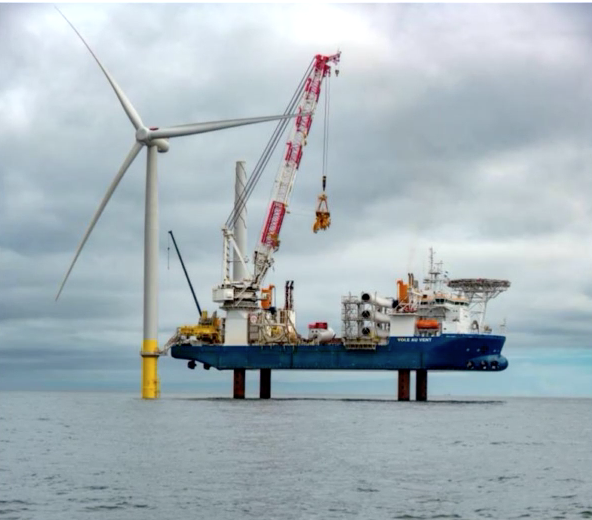The U.S. Senate’s passage of the 700-plus-page, omnibus economic and energy Inflation Reduction Act includes $369 billion to advance clean energy programs. This includes offshore wind development and pressing a U.S. transition to electrifying transportation and residential energy use.
The bill now up for approval by the House of Representatives could reduce U.S. carbon emissions by about 40% by 2030, according to Senate Majority Leader Charles Schumer, D-N.Y., a key architect of the narrowly approved (51-50) measure.
It includes $80 million in tax credits and other consumer incentives to encourage people to buy electric vehicles, energy-efficient induction stovetops, home heat pump systems and rooftop solar panels. A much bigger chunk at $260 billion in clean-energy tax credits is targeted at helping renewable energy development grow, from manufacturing components in the U.S. to building projects like offshore wind turbine arrays.
Offshore wind promoters say the legislation would be a big win for them. Extending tax credits for years will help wind developers nervous about the escalating costs of raw materials. The still-developing U.S. offshore wind industry is watching Virginia state utility regulators’ concerns about Dominion Energy’s massive Coastal Virginia Offshore Wind project, the biggest to date, which won state approval Friday.
“The Senate’s passage of the Inflation Reduction Act is a watershed moment in America’s renewable energy transition. This historic legislative package sends a message to the world that the U.S. is serious about bolstering supply chain resiliency, increasing American energy security, and reaching our ambitious goal to deploy 30 gigawatts of offshore wind power by 2030,” Liz Burdock, president and CEO of the nonprofit advocacy group Business Network for Offshore Wind, said in a statement.
The bill allots $40 billion for investment, including shipbuilding for wind power, that “will unleash the vast potential of offshore wind and localize a supply chain on American shores creating thousands of good-paying jobs,” said Burdock.
Compromises forced on Democratic congressional leaders by Sen. Joe Manchin, D-W. Va., ensured the legislation can allow continuing offshore development of oil and gas production. Environmental groups lobbied the Biden administration hard to prevent it.
But in the end, the package had the “all of the above” approach to energy taken by the Obama administration a decade before, when it accepted fossil fuel development even while promoting offshore wind potential. Opponents of offshore drilling were unhappy.
Those “offshore drilling provisions that benefit the fossil fuel industry ... place an unfair burden on Gulf of Mexico and Alaska communities,” said Beth Lowell, the environmental group Oceana’s U.S. vice president.
“Mandated offshore drilling flies in the face of President Biden’s campaign commitment to end new leasing for dirty and dangerous offshore drilling," she said. "New offshore drilling leases compromise efforts to address the climate crisis and won’t help lower gas prices. President Biden must reaffirm and uphold his promise to end new oil and gas leasing by finalizing a five-year program with no new lease sales.”
Offshore industry operators saw plenty of opportunity in both old and new energy sectors.
“We extend our thanks to Senator Manchin for his leadership in securing an all-of-the-above energy package that boosts offshore oil and gas, offshore wind, and carbon capture and storage — all key priorities for the offshore sector and for long-term American energy security,” said Erik Milito, president of the National Ocean Industries Association.





